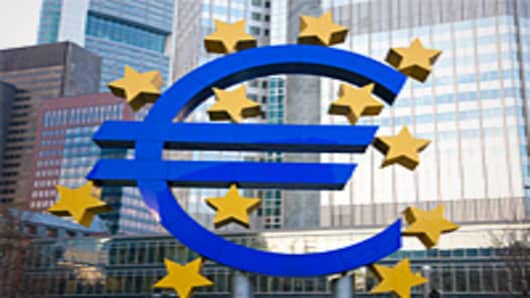A market tethered to hopes for a European debt crisis solution is likely to remain in a state of confusion, even if two upcoming summits exceed muted expectations.
As a result, market volatility will continue until there are some signs that the EU is finally getting its debt crisis under control. And the betting is now that it could take months or more for the situation to get resolved.
"Even if the Europeans come up with something very robust that shows they're going to try to deal with the crisis, this is going to be a long slog," says Bill Isaac, head of financial institutions practice at FTI Consulting in Vienna Va. "The problem is a bunch of countries are way overextended and somebody's going to have to take some losses."
A continuous torrent of vague, conflicting headlines has dominated the crisis, with Thursday offering more of the same.
Have France and Germany agreed on a bailout amount? How much will banks need for recapitalization after a Greek default? Is Italy really the problem and will a "Bazooka Bank" be needed to buy up all the risky debt in the euro zone?
To varying degrees these key questions have gone unresolved, and markets react each time there is even the most minute development.
"What US markets need from Europe as a minimum is a credible plan to recapitalize its banks in a way that guarantees solvency," Hans Mikkelsen, credit strategist at Bank of America Merrill Lynch said in a research note.
Stocks have become almost entirely disengaged from US news as the debt dilemma drags on. A decent earnings season and nascent signs of an economic recoveryhave failed to get equities out of a volatile trading range, with Europe controlling virtually all the market's moves.
Irrational as it may seem regarding a crisis that still appears to be well from the American doorstep, investors remain fearful that all could change quickly.
Isaac, the former chairman of the Federal Deposit Insurance Corp, says the market is stuck in a "short-sighted trading mentality" in which investors are unrealistic that the problems can be solved quickly. Any solution, he says, will lead to pain.
"Dragging it out is certainly not helpful," he says. "Anybody who thinks they'll go into a meeting this weekend and make a bunch of decisions...that doesn't mean it's going to go away. It's still a very serious situation."
Stocks erased earlier losses Thursdayfollowing reports that France's Nicolas Sarkozy and Germany's Angela Merkel had reached an accord ahead of this weekend's European Union summit on steps needed to fix the crisis.
Never mind that 60 percent of companies reporting earnings so far have beaten expectations, or that some economists who had feared another recession for the US are getting a bit more optimistic.
All that matters is Europe.
"At the end of the day whether the U.S. is in recession or not doesn't matter now," Dan Greenhaus, chief global strategist at BTIG in New York, said in a CNBC interview. "Equities are entirely trading, obviously, on what's going on in Europe."
Investors hanging their hopes on a solution in the coming week, though, could be setting themselves up for yet another disappointment.
EU officials are meeting Saturday and Sunday and then again on Wednesday to hash out a solution.
The weekend summit will entail a series of three meetings: a Saturday gathering of the Economic and Financial Affairs Council, or ECOFIN, followed by Sunday sessions of the European Council and finally the EU summit.
Even with a reported pact over the amount needed to recapitalize banks exposed to sovereign debt in Greece and elsewhere — likely to be near 100 billion euros ($138 billion) — investors probably won't be satisfied.
As such, European officials have been trying to temper expectations as negotiations continue over how large a debt bailout fund will need to be, as well as the extent to which bondholders will have to take principal haircuts on their investments.
"The authorities are getting to the point of trying to dumb-down expectations so much because it is just a very difficult problem to resolve," says Andrew Wilkinson, chief economic strategist at Miller Tabak in New York. "It's not a single problem, its a multitude of problems."
Among the ideas the EU likely will examine is one along the lines of a "bad bank," a device that authorities can create to buy up toxic debt and ease liquidity conditions.
Citigroup economists say the European Financial Stability Fund could be used to create a "Bazooka Bank" that would take on the questionable euro-zone debt. However, Citi's Willem Buiter and Ebrahim Rahbari worry that the numbers being bandied about — a 310 billion-euro fund that could be leveraged up to 1.55 trillion — would be too small to address the issue.
Buiter, Citi's chief economist, is a former member of the Bank of England's Monetary Policy Committee and chairman of the London School of Economics' European Institute.
"That would likely not fund the Spanish and Italian sovereigns until the end of 2012," the two said in a research note. "It would not be a big bazooka but a small pea shooter."
Part of the problem — and the reason for investor apprehension — is a persistent belief that European leaders still are not taking the debt crisis seriously enough.
"Policymakers are...anxious to convince investors that Greece is an isolated problem," John Higgins, senior market economist at Capital Economics in London, said in a note. "The upshot is that the mooted recapitalization of the banking system seems set to disappoint."



